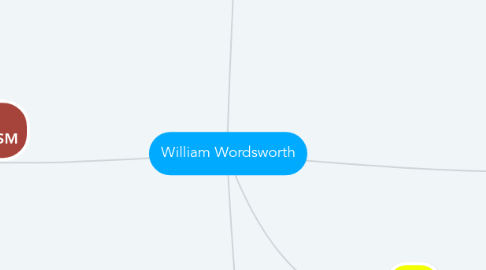
1. THE MANIFESTO OF ENGLISH ROMANTICISM
1.1. 18th century poetry
1.1.1. artificial and elevated ("poetic diction")
1.2. Wordsworth
1.2.1. Romantic poets'1st generation
1.2.1.1. LYRICAL BALLADS
1.2.1.1.1. Coleridge
1.2.1.1.2. W.
1.2.2. Poetry is a solitary act
1.2.2.1. Originated by emotions recollected in tranquillity (memories->emotions purified)
1.2.2.2. Immagination=intuition
1.2.3. The poet is a man among men writing about what intersts mankind
2. life and works
2.1. LIFE
2.1.1. 1770- Cumberland - English Lake District - in 1770.
2.1.2. THOUGHTS ON THE REVOLUTION
2.1.2.1. In 1790 : walking tour of France and the Alps.
2.1.2.1.1. 1793 - nervous breakdown.
2.1.2.1.2. revolutionary France inspired democratic ideals
2.1.3. In 1791 met and fell in love with Annette Vallon.
2.1.3.1. Caroline.
2.1.4. 1795: moved to Dorset with his sister Dorothy
2.1.4.1. DOROTHY
2.1.4.1.1. She's a key figure because of her faithful friendship with his brother and her constant support which encouraged Wordsworth's poetry.
2.1.4.2. SAMUEL TAYLOR COLERIDGE
2.1.4.2.1. Their friendship was central to the development of English Romantic poetry
2.1.5. 1799: William and Dorothy settled in the Lake District
2.1.5.1. 1802: William married Mary Hutchinson, they had five children.
2.1.6. 1843: Poet Laureate.
2.1.6.1. The last years ofhis life were marked by the growing conservatism of his political views.
2.1.6.1.1. He died in 1850.
2.2. WORKS
2.2.1. In the following years Wordsworth wrote some of his best poems (two volumes in 1807)
2.2.1.1. 1805: The Prelude, a long autobiographical poem in 14 books, subtitled ‘Growth ofa Poet’s Mind’, (published only after his death.)
2.2.2. ‘Lucy poems’, a series of five poems written between 1798 and 1801.
3. nature
3.1. shared Rousseau's faith in the
3.1.1. goodness of nature
3.1.2. excellence of the child
3.2. man and nature are inseparable
3.2.1. man = active participant
3.3. includes BOTH inanimate and human nature
3.3.1. (pantheistic view)
3.4. source of PLEASURE & JOY
3.4.1. comforts man in sorrow and teaches him how to love and act in a moral way
3.5. through the cultivation of senses and feelings man can achieve good
3.5.1. included sensory perceptions (sight, hearing)
3.5.1.1. influenced by associationist philosopher David Hartley (1705-1757)
3.5.1.1.1. moral character develops during childhood and is the product of the pain/ pleasure caused as a result of our physical experiences
3.6. HOW DOES NATURE INFLUENCE THE POET AT DIFFERENT STAGES IN HIS LIFE?
3.6.1. MEMORY
3.6.1.1. major force in the poet's mind and moral character growth process
3.6.1.2. allows Wordsworth to give poetry life and power
4. the Poet
4.1. a being with great sensibility able to experience things on a deeper level and through his IMAGINATION able to show others their true feelings and improve their moral beings
4.2. he must draw attention to the most ordinary things and the humblest people in order to understand the deeper emotions and truths
5. style
5.1. tended to use the blank verse
5.1.1. abandoned 18th century heroic couplet
5.1.2. just as skilful with other other verse forms but favoured them less

